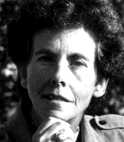Canadian Theatre Encyclopedia
Marchessault, Jovette

Playwright, novelist, painter, and sculptor, born into a working class family in Montreal, Quebec in 1938, died December 31, 2012.
She began work at a textile mill but at the end of the 1950s trekked across America in search of her First Nations roots and identity. A self-educated painter and sculptor, she had over thirty solo exhibitions in Quebec City, Toronto, New York, Paris and Brussels.
She was a feminist who was concerned not only with the place of women artists in current society, but also with their place in history. Her writing is lush, image-laden and sometimes almost musical in its poetry.
She began her writing career with a novel, Comme une enfant de la terre, which won the France-Quebec prize in 1976. In 1980, she published a second novel, La mere des herbes, and Tryptique lesbien (Women's Press).
She was inspired to write for the theatre by Pol Pelletier's extraordinary dramatization of her lyric prose piece Les vaches de nuit (translated by Yvonne Klein as Night Cows) at Montreal's International Women's Day celebrations in 1979 (Théâtre expérimental des femmes/TEF). In the following six years, she produced plays which were major critical and box office successes - each according to her self-imposed mandate of unearthing the history of women writers. La Saga des poules mouillées (Théâtre du Nouveau Monde, 1981, translated by Linda Gaboriau as The Saga of the Wet Hens,Tarragon Theatre, 1982) is about four French Canadian women writers - Laure Conan, Germaine Guevremont, Gabrielle Roy and Anne Hebert - in an anachronistic parody of the Last Supper. La terre est trop courte, Violette Leduc (TEF, 1981, translated by Suzanne de Lotbinière-Harwood as The Edge of the Earth is Too Near, Violette Leduc) is about the lesbian novelist's fraught life in Paris, and her relationships with Simone de Beauvoir and Jean Genet, and her final triumph with her autobiography La Batarde (Nightwood Theatre, 1985, dir. Cynthia Grant. Alice & Gertrude, Natalie & Renee et ce cher Ernest is about the celebrated Paris lesbians Alice B. Toklas, Gertrude Stein, Natalie Barney and Renée Vivien. It was followed by Anais dans la queue de la comète, about Anais Nin, Henry Miller and June Miller (Théâtre de Quat'Sous, 1985, translated by Lotbinière-Harwood as Anaïs in the Comet's Wake, also translated into Hindi); Demande de travaille sur les nébuleuses (Théâtre d'Aujourd'hui, 1988); Le Lion de Bangor (Théâtre L'Aire de Jeu, 1993); Madame Blavatsy (Carré Théâtre, 1999).
She won the Governor General’s Award for Le Voyage magnifique d'Emily Carr (Théâtre d'Aujourd'hui, 1990, translated by Linda Gaboriau as The Magnificent Voyage of Emily Carr, Belfry Theatre, 1992).
In the words of theatre scholar, Louise Forsyth, "often interpreted by Pol Pelletier, she was – visionary poet, feminist, lesbian – the leading pioneer playwright in the emergence in Québec of an impressive cohort of feminist playwrights in the 1980s and continuing until today."
Profile by Gaetan Charlebois. Additional information from Aida Jordao.
Last updated 2020-11-10

